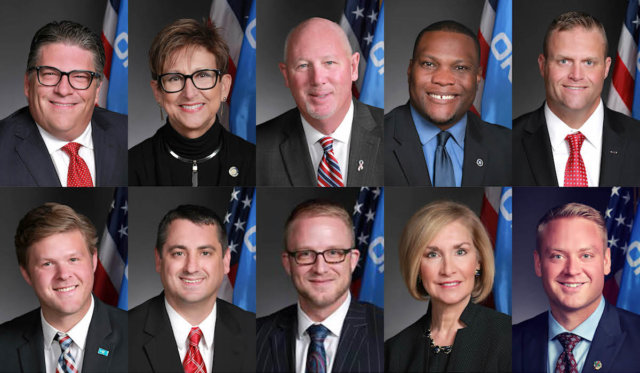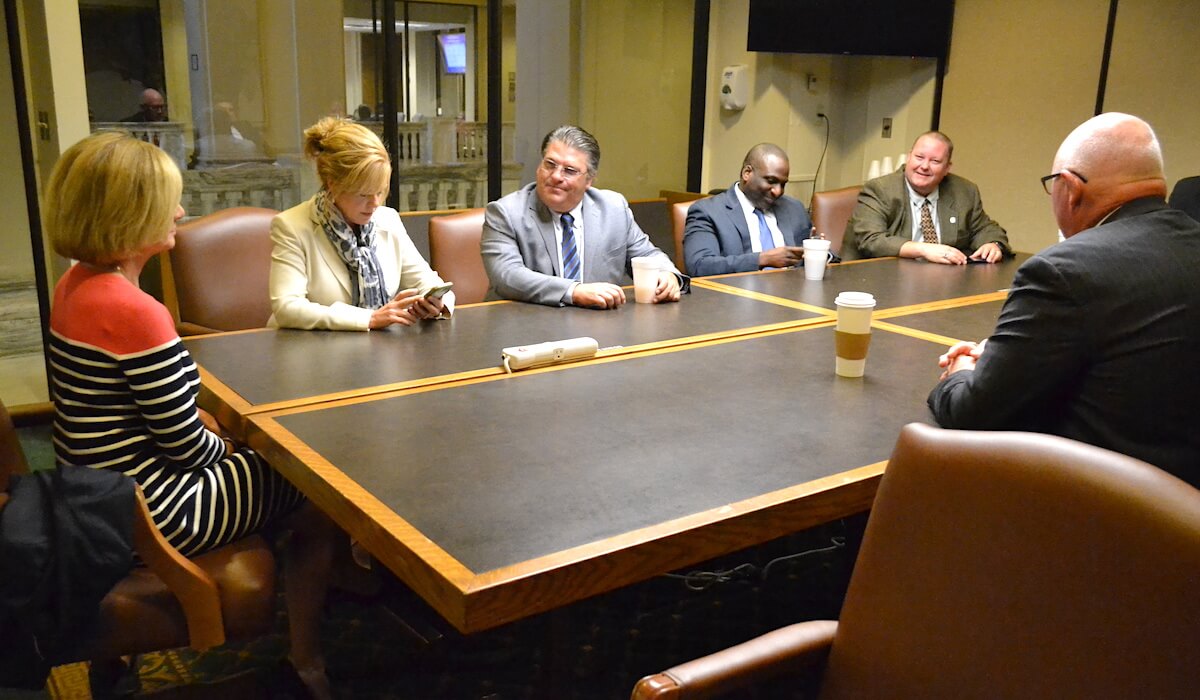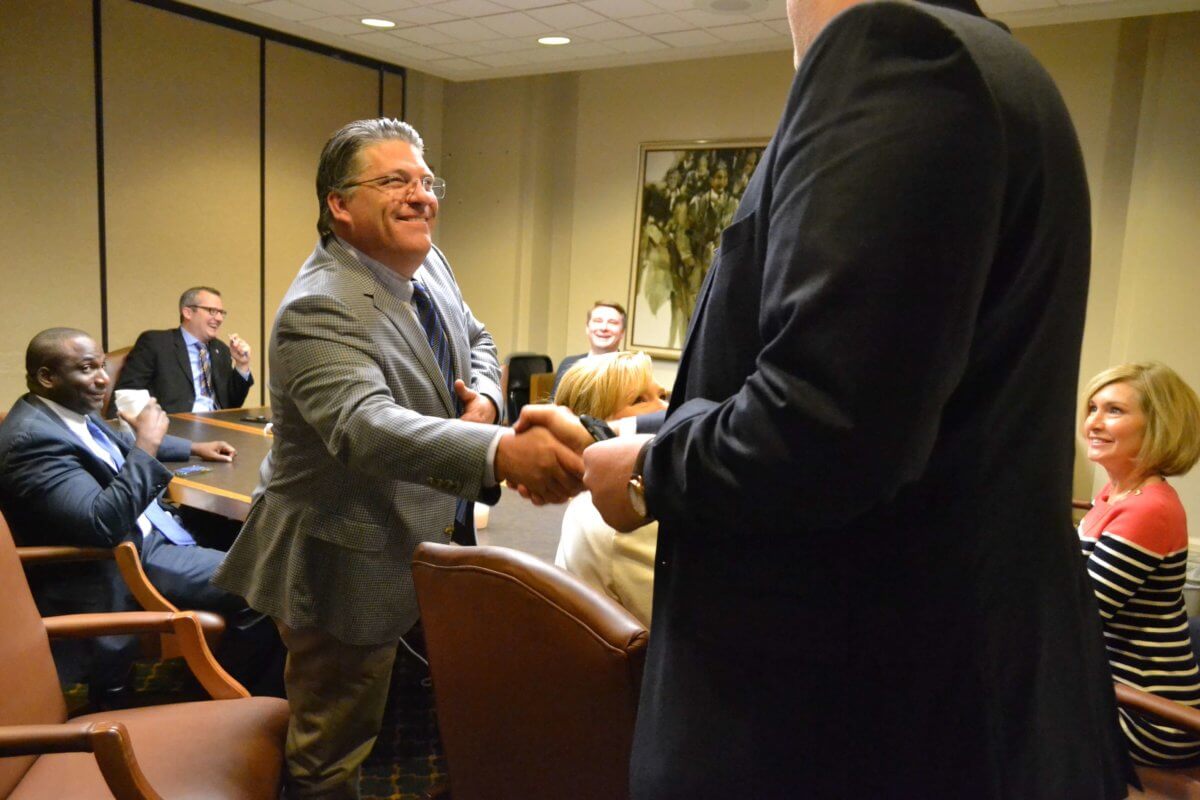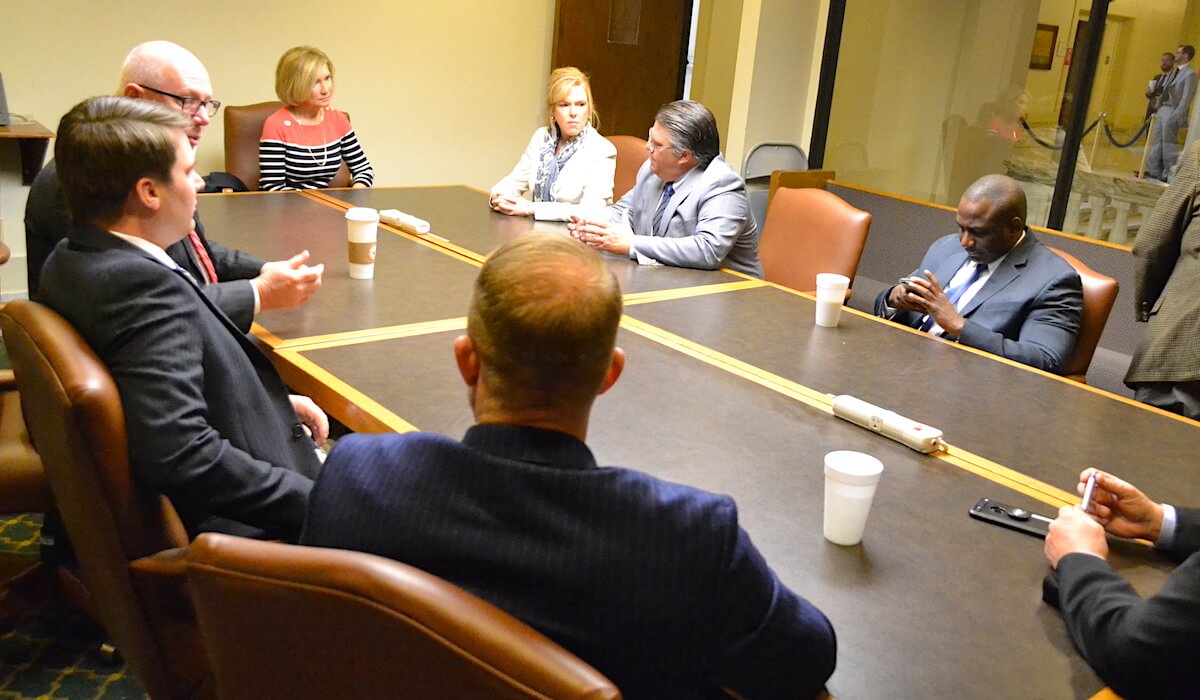

During Meloyde Blancett’s three decades in the business world, she never considered herself a partisan person. She still doesn’t, despite representing Oklahoma House District 78 in Tulsa as a Democrat.
“I used to call myself a ‘Republicrat’ because I didn’t really have a flavor. It’s more policy related for me,” Blancett said. “I don’t mean to say I’m not loyal to the Democratic Party, I just don’t live and die by that. I just don’t because I think that’s dysfunctional.”
“Dysfunctional” is a word she and many other freshmen lawmakers have used to describe 2017, their first year in the Oklahoma Legislature.
“What I witnessed in the state Legislature this last year was worrisome and shocking,” Blancett said. “What leads to that is a certain kind of venomous, cancerous behavior that is called partisanship. Not only is it partisanship, but it is this whole notion of, ‘If you win, I lose,’ and ‘I am going to do everything in my power — even if it’s unethical and borderline irresponsible — to keep you from winning.’
“That’s the environment I see today. I think it’s destructive, I think it’s irresponsible, and I think it’s got to change.”
Entering her second regular session Feb. 5, Blancett is far from alone in hoping the Legislature’s large freshman class — 38 House members and 16 Senate members — can change the culture, atmosphere and results at 23rd and Lincoln.
“I would assume that some of the classes before me have said the same things when they came in. Over time, they may harden and there may be separation with the two parties,” said freshman Rep. Josh West (R-Grove). “I think Oklahomans are sick of it. No one ever asked me when I was knocking doors whether I was a Republican or a Democrat. They wanted to know what I was going to do for rural health care, rural education, bringing jobs to rural Oklahoma. They didn’t care that I was a Republican.”
Freshmen lawmakers form bipartisan ‘caucus’

As leaves began turning last fall and the Legislature plodded through a tumultuous special session, Rep. Roger Ford (R-Midwest City) and Rep. Collin Walke (D-OKC) had a conversation.
“He and I both thought that the freshman class could really bond together and work as a cohesive group,” Walke said. “So we thought it would be a good idea to start caucusing as a bipartisan group.”
Ford and Walke had two formal meetings that spelled the beginning of a “Freshman Caucus,” something Ford and other lawmakers said they think might be a first of its kind, at least in the past decade.
“The first session was a venting session where we kind of aired our grievances,” Walke said. “The second one we had was a lot more policy focused — looking to see what we’d like changed out there. Roger and I are going to touch base [this] week and see, if we are going to have monthly meetings, what are those going to be comprised of.”
Ford said he hopes to have the Freshman Caucus meet monthly this session.
“The second meeting I thought went much better. We actually talked about things we could come together on and things we are apart on,” Ford said. “There’s nothing wrong with being on different sides of an issue, as long as we can do it in a respectful manner and try to make progress. That’s what we wanted to accomplish, and we’re headed in that direction.”
More than a half-dozen freshmen lawmakers interviewed for this story emphasized that improving the culture at the Legislature will require developing “relationships” among members, especially across the aisle. In the case of Ford and Walke, the pair already had one of those prior to their 2016 elections.
“I went to school with his daughter,” Walke said of Ford. “My brother went to school with his son. So I’ve known him — for all intents and purposes — for my whole life. That gave us an introduction that made it easier to break the ice.”
Ford agreed.
“I’ve known him since he was a kid. I’ve known his parents for 35 or 40 years, and it’s a great family,” Ford said of Walke. “As we both came in as freshmen, we’ve always had social conversations, and that will continue. We are on opposite ends of the political spectrum, but it doesn’t mean we have to attack each other or be negative every time somebody comes up with a new idea. We felt like maybe if that relationship could spread there would be value down the line.”
Ford said the early meetings and resultant discussions have given him hope for less partisanship in the House moving forward.
“With the freshmen meetings we’ve had, several people have built relationships that they didn’t have before. I certainly have. Just talking to people on a more personal basis when you see them in the hallway,” Ford said. “If we build relationships, maybe we can just sit down and talk in a positive manner, even in years to come.”
‘We have an opportunity, so stop the social media war’.
Throughout 2017’s elongated legislative sessions, several arguments broke out among members on social media. Those disputes fueled a public perception that the Legislature is inept and stocked with people prone to petulant behavior.
“Toward the end of regular session, there were Twitter wars going on, and I got caught up in that for just a moment. Us blaming them, them blaming us,” said Rep. Scott Fetgatter (R-Okmulgee). “I was found guilty on that like everybody else, but I realized real quickly that we were falling into the trap of the Capitol. So I started changing my focus toward going to people who were in that trap also and saying, ‘Hey, we have an opportunity, so stop the social media war.’”
Fetgatter said he is not naive enough to think camaraderie in the House of Representatives will change immediately, but he said the sheer number of freshmen lawmakers requires that they step up early and lead.
“My intention when I came into the Legislature really was to come up here, sit back, not say much for the first couple of sessions and really understand and learn,” Fetgatter said. “Then when I got up here and realized how large our class was and how different our thought processes were on some issues, I realized I had to become more involved than I planned in my first year.”
Asked to name freshmen lawmakers with whom he has developed relationships, Fetgatter pointed to four colleagues in particular: two Republicans and two Democrats.
“I have a really good personal relationship with Josh West and Marcus McEntire,” Fetgatter said. “And then on the Democrat side, I feel like I have a good relationship with Forrest Bennett. We vehemently disagree on a lot of issues, but at the same time, we’ll walk up and give each other a big ol’ bear hug. And then Collin Walke. Those four are people that, if I have a question or issue or if I’m running a bill, I’ll say, ‘Will you support me?’”
Bennett (D-OKC) said Fetgatter has “always been kind” to him and said the sheer fact there are more Republicans than Democrats in the House means GOP members must inherently help lead any culture changes.
“I’m all for it,” Bennett said. “What I tell my Republican freshman colleagues is that when a lot of people call for moderation in politics, I kind of reject that. We can have our ideas. I don’t want anybody to abandon their principles, but I think we can passionately debate policy ideas without making it personal. We can change that culture.”

‘Can’t wait until somebody in this freshman class is speaker’
While freshmen lawmakers are holding out hope that they can become close and work together as they gain leadership positions in the future, Rep. Monroe Nichols (D-Tulsa) pointed to the 2017 session as a paradox.
“I think we — from the time I was elected — heard so much about the big freshman class that was coming in and the quality of folks in this freshman class, and that was exciting,” he said. “On the flip side of that, the folks who have been there for 11 years or nine years all said this was the worst year of their career.
“It was kind of a weird deal to reconcile in your head — how those two things can be true?”
Nichols joined Fetgatter in referencing the size of the freshman class. With term limits bumping another 12 House members and six senators out of office in 2018, the 52 current freshmen lawmakers could be joined by 18 new legislators in 2019 for a total of 70 people — or 47 percent of the Legislature — with two years of experience or less. Throw in lawmakers who may choose not to seek re-election in 2018, such as Rep. Pat Ownbey (R-Ardmore) and Rep. Dale Derby (R-Owasso), and that could rise to 50 percent.
“The quality of the people on the floor is a lot better than the quality of what we produce,” Nichols said of the Legislature.
But he also said the cupboard is not entirely stocked with talent in earlier classes.
“There are some folks — I will be very candid — who do not belong in the Legislature. I won’t name names, but they shouldn’t be there,” Nichols said before pointing to behavior he would like to see changed. “There is a lack of respect, generally speaking. There’s a certain arrogance that comes along with being in the majority, I think. I’m sure Democrats were arrogant when they were in the majority sometimes.”
Nichols referenced an incident in May when Democrats confronted Republicans for disrespecting Rep. Regina Goodwin (D-Tulsa) on the House floor.
“Can this freshman class change that standard? We have the potential to. But we can’t wait until somebody in this freshman class is speaker because that’s what everybody says,” Nichols said. “So as freshmen, there are changes that we are going to have to accelerate. Cause we had some rough days in the Capitol this year, but it was rougher out there for the public.”
‘We all campaigned basically on the same message’

Among many other lawmakers preaching the value of “relationships” for the freshman class are Rep. Tammy West (R-Bethany), Rep. Tim Downing (R-Purcell) and Rep. Mickey Dollens (D-OKC).
“I think relationships are everything in life and certainly in the Legislature,” said Downing, who noted he missed the two Freshman Caucus meetings in 2017 but only because he had other obligations. “The thing that has impeded us from being able to govern really well is not maintaining really great relationships, in our own caucus, across the aisle, across the rotunda, with the governor’s office.
“I think it’s wise that you’re hearing that from freshmen who say that’s got to be a priority because that’s exactly right.”
One of four House members with her surname first elected in 2016, Tammy West said she has heard of another state where lawmakers are required to gather as a bipartisan group twice a year just to share a meal together.
“I really like that idea. You’ve got to be able to trust and respect, and you do that by seeing people when they are not sitting behind the desk working on a policy issue,” Tammy West said. “I think we need to do a better job of getting together. We don’t have time to play games. Your ‘yes’ needs to be ‘yes,’ and your ‘no’ needs to be ‘no’ (on issues). We don’t have time to play games. I feel very resolute.”
Dollens said he believes freshmen lawmakers of both parties share many of the same priorities.
“The great thing about the freshman class is we all campaigned basically on the same message of fixing the budget, helping education, rural hospitals — the things that require investment,” Dollens said. “And that is so different than previous classes of legislators, particularly on the Republican side, who ran on never raising a tax, who actually signed the Grover Norquist pledge and who are beholden to these old, outdated ideologies that are ruining our state.”
A former prosecutor in the Attorney General’s Office, Downing said he even has hope that freshmen lawmakers can pave a way toward compromise on even the most contentious policy issues.
“Criminal justice has probably been one of the most divisive policy issues because it elicits so much passion from people on both sides of the issue,” he said. “The greatest challenge wasn’t the policy. The greatest challenge was all of the relationships, not just in the Legislature but from outside groups too that want to influence the policy.”
Still, Downing said he does not see a ton of partisanship outside of one topic in particular.
“Honestly, and this may sound crazy, but aside from the 76-vote measures where they’re really kind of caucus driven, setting that issue aside for a moment, I would tell you that partisanship isn’t really that bad in the building,” Downing said. “I really think the only place that partisanship has broken down our ability to function as a Legislature is when it comes to the 76-vote requirement because it requires them to play as a block and play as a team, which makes sense. Otherwise I would say partisanship hasn’t been a barrier.”
Asked to name freshmen Democrats with whom he has found commonality, Downing pointed to Walke as a fellow attorney on the House Judiciary Committee.
“I like all of them, I’d hate to name just one,” he said. “I know that sounds cheesy, but it’s true. As far as the freshmen go, I enjoy every one of them. Haven’t had any type of negative interaction with anyone.”
Dollens named Josh West and Rep. Marcus McEntire (R-Duncan).
“The thing is, a lot of times we are told information from our leadership, and that’s about where we got it,” Dollens said of meeting with other freshmen. “One of the cool things about this freshman class is that we are able to have meetings like we did that day (in October), and then to say, ‘Well, this is what we want.’ We’re told this is why this is happening here, and then to kind of come to our own individual conclusions instead of being told. That’s probably what was discussed most in that meeting is just having more transparency and being able to communicate more.”
But while the quotes in this story may form a picture of hope that bipartisanship can take hole, Blancett said she is eagerly waiting actions to back up words.
“I’ve seen a lot of words — oh this is terrible, I hate it, blah blah blah — but I have not seen a lot of deeds to do anything about it,” said Blancett, who spoke to NonDoc on her birthday while preparing for her 2018 kickoff fundraiser. “The courage has got to come in where there are deeds. If you think it’s a bad process, and you think it’s dysfunctional and dysfunction, then you have to stand up and go against it out loud. Not just pretend in some corners that it’s awful and horrible, but when it comes down to voting, you vote like the rest of them.
“If we’re going to make any changes, this freshman class and anyone who wants to join this freshman class and make changes in the Legislature needs to have enough guts to step out.”




















